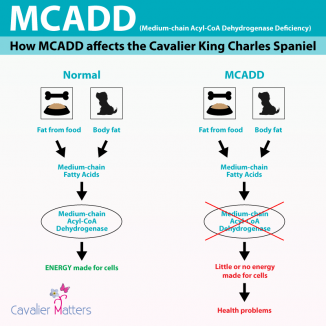A serious new genetic disorder has been found in the Cavalier King Charles Spaniel.
In Brief
 MCADD is caused by a fault in the gene that provides the instructions to make an enzyme called medium-chain acyl-CoA dehydrogenase (MCAD). This genetic fault causes the enzyme to either not work properly or be missing entirely, which means the body cannot fully break down fat to release energy.
MCADD is caused by a fault in the gene that provides the instructions to make an enzyme called medium-chain acyl-CoA dehydrogenase (MCAD). This genetic fault causes the enzyme to either not work properly or be missing entirely, which means the body cannot fully break down fat to release energy.
If MCADD-affected dogs consume MCT oil which is found in Coconut, Palm and Kernel Oil, this can cause a severe reaction.
The affected CKCS needs to breakdown certain fats quickly when their bodies run out of glucose; the stored fat which would normally be converted to energy cannot be produced quickly enough to meet the dog’s needs. This may cause them to suffer from low blood sugar, seizures, coma or sudden death.
With an early diagnosis, MCADD can be managed successfully by diet, a simple DNA test can save your dog’s life.
Symptoms to watch out for:
 Seizures: Seizures or convulsions. If your CKCS experiences seizures, it’s important to consult a veterinarian for proper evaluation.
Seizures: Seizures or convulsions. If your CKCS experiences seizures, it’s important to consult a veterinarian for proper evaluation.- Lethargy: Unexplained and prolonged lethargy or weakness can be a sign of an underlying health issue, including metabolic disorders like MCADD.
- Episodic Illness: These episodes can include vomiting, decreased energy levels, and more severe symptoms like seizures.
- Unsteady Gait: Difficulty walking, balance issues, or uncoordinated movements might be observed during episodes of illness.
- Loss of Appetite: If your CKCS suddenly loses interest in food or experiences a decreased appetite, it could be a symptom of an underlying condition.
- Low Blood Sugar (Hypoglycaemia): MCADD can lead to hypoglycaemia, which may cause weakness, shakiness, disorientation, and even seizures
- Abnormal Behaviour: Changes in behaviour, such as increased irritability or confusion, can sometimes be indicative of a metabolic disorder.
- Respiratory Distress: In severe cases, dogs might experience difficulty breathing or rapid breathing during an episode.
- Recurrent Infections: Some dogs with MCADD may have a higher susceptibility to infections.
- Neurological Symptoms: Dogs with MCADD may exhibit neurological symptoms during episodes, such as circling, head pressing, or lack of coordination.
Obviously these can be signs and symptoms of other conditions too, so keep records and have your dog evaluated. Many veterinarians WILL NOT yet be aware of MCADD so please show them this information.
these can be signs and symptoms of other conditions too, so keep records and have your dog evaluated. Many veterinarians WILL NOT yet be aware of MCADD so please show them this information.
The research needs more Cavaliers to be tested! It’s an inexpensive, simple swab test kit that you can order and complete at home. Over 200 dogs have been tested in UK and Europe, with similar results – Clear: 35%, Carriers: 53%, Affected: 12%. ALL breeding dogs need to be tested.
How you Can Help.
You can order a simple DNA test kit from the UK laboratories listed below.
Please report your results to Bridgette Evans who is collating all results to build a picture of the state of the spread in the gene pool.
Bridgette has setup a Facebook group to help and support owners dealing with this disease as well as providing up to date information.
Link https://www.facebook.com/groups/1362538764293286
DNA Tests Available from:-
Laboklin Laboratory for Clinical Diagnostics
https://www.laboklin.co.uk/laboklin/showGeneticTest.jsp?testID=8288
University of Cambridge
https://www.cagt.co.uk/product/medium-chain-acyl-coa-dehydrogenase-mcad-deficiency/
Gensol Diagnostics (USA)
https://www.gensoldx.com/tests/medium-chain-acyl-coa-dehydrogenase-deficiency-mcadd/

